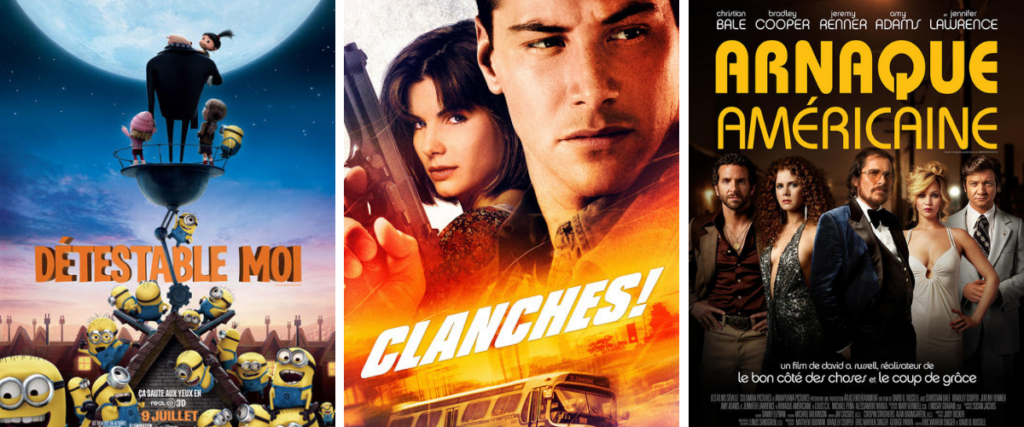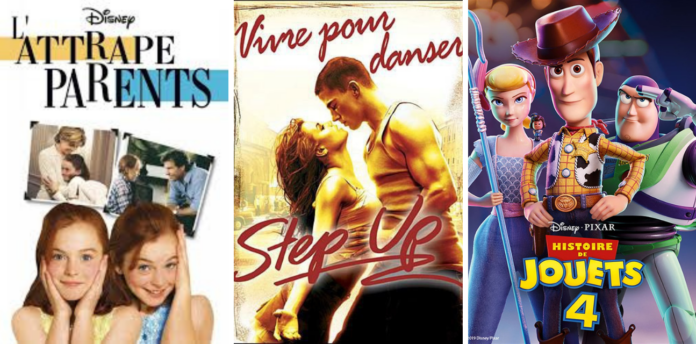When it comes to translating movie titles, the approach and final result can vary significantly between countries, even if they share the same language. French Canadian and French movie titles often differ due to cultural nuances, regional preferences, and language variations. Let’s explore some of the key differences between translated Quebec movie titles and their counterparts in France.
And don’t forget: if you want to improve your French skills by watching some of your favorite movies translated in French, be careful which version you choose! Movies dubbed in French Canadian are different from movies dubbed in French.
The Differences Between Translated Quebec Movie Titles and the Ones in France
Cultural Adaptations
One of the primary reasons for the differences in movie titles is cultural adaptation. French Canadian titles are often tailored to resonate with the local audience in Quebec and other Francophone regions of Canada. This involves considering cultural references, slang, and idiomatic expressions that are unique to French Canadian culture.
For instance, the movie Honey, I Shrunk the Kids is translated to Chérie, j’ai rétréci les gosses in France. But in Quebec, “gosses” means “balls”… That’s why, in Quebec, this movie title is translated as Chérie, j’ai réduit les enfants which is a more locally understood way of saying the same thing.
Legal and Regulatory Considerations
In some cases, legal and regulatory considerations can influence movie titles. In Quebec, the Office québécois de la langue française (or OQLF, like the OQLF exam) regulates the use of French in public communications, including movie titles. This can lead to different translation choices to comply with local language laws.
For example, The Fast and the Furious series is known as Fast & Furious in France, aligning closely with the English title. In Quebec, the titles are translated to Rapides et dangereux, which means “Fast and Dangerous,” adhering to regulations that promote the use of French.
Language Variations
While French is the official language in both France and Quebec, there are notable differences in vocabulary and usage. French Canadian translations often reflect these linguistic variations to ensure that the movie titles are easily understood by the local audience.
For example, the movie The Hangover is known as Very Bad Trip in France, using English words that have been integrated into everyday French vocabulary. In Quebec, the same movie is titled Lendemain de veille, which translates to “The Morning After a Drunk,” using more traditional French Canadian terms.
Marketing Strategies
Marketing strategies also play a significant role in the differences between translated movie titles. Movie distributors tailor titles to attract local audiences effectively, sometimes opting for titles that are more descriptive or that hint at the movie’s genre or plot.
For instance, Step Up was released as Sexy Dance in France: this way, French people were aware it’s a movie about dance and that it will get sexy. In Quebec, it was titled Vivre pour danser.
Humor and Sensitivity
Humor and sensitivity are other factors influencing translated titles. French Canadian humor can be distinct from French humor, and what might be considered funny or acceptable in one region might not be perceived the same way in another. Translators often adapt titles to ensure they align with local tastes and sensibilities.
A notable example is the movie Speed, which is translated to Clanches! in Quebec, a play on the verb “clancher”, which means “accélérer” (to speed up). In France, the title remains Speed likely because the original English title can be easily understood.
The Weirdest Quebec Movie Title Translations
Here are some of the weirdest and most interesting movie title translations in French Canadian. We put the Quebec title, then the English original title, and finally the French title.

À l’ombre de Shawshank = The Shawshank Redemption = Les Évadés
À travers le temps = About Time = Il était temps
Amour et Magie = Practical Magic = Les Ensorceleuses
Arnaque américaine = American Hustle = American Bluff
L’attrape-parents = The Parent Trap = À nous quatre
L’aube des morts = Dawn of the Dead = L’Armée des morts
Blonde et légale = Legally Blonde = La Revanche d’une blonde
Chérie, j’ai réduit les enfants = Honey, I Shrunk the Kids = Chérie, j’ai rétréci les gosses
Clanches! = Speed = Speed
Commando des bâtards = Inglourious Basterds = Inglourious Basterds
Danse lascive = Dirty Dancing = Dirty Dancing
Détestable moi = Despicable Me = Moi, moche et méchant
Du soleil plein la tête = Eternal Sunshine of the Spotless Mind = Eternal Sunshine of the Spotless Mind
Fiction pulpeuse = Pulp Fiction = Pulp Fiction
Film de peur = Scary Movie = Scary Movie
Histoire de jouets = Toy Story = Toy Story
Laisse tomber, il te mérite pas = He’s Just Not That Into You = Ce que pensent les hommes
Lendemain de veille = Hangover = Very Bad Trip
Oublie Sarah Marshall = Forgetting Sarah Marshall = Sans Sarah, rien ne va !
Le Pacte du silence = I Know What You Did Last Summer = Souviens-toi… l’été dernier
Le pouilleux millionnaire = Slumdog Millionaire = Slumdog Millionaire
Rapides et dangereux = The Fast and the Furious = Fast and Furious
Sens Dessus Dessous = Inside Out = Vice Versa
Supermalades = Superbad = SuperGrave
Le Tout pour le tout = Bring It On = American Girls
Une vie de bestiole = A Bug’s Life = 1001 pattes
Vivre pour danser = Step Up = Sexy Dance
The differences between translated French Canadian movie titles and translated French movie titles highlight the importance of cultural, linguistic, and regional considerations in the translation process. While both countries share the French language, the unique aspects of their respective cultures and languages explain why they need different translations. By tailoring movie titles to local preferences, translators ensure that movies are accessible, relatable, and appealing to their target audiences.
And also, it’s always funny to compare those movie titles!











